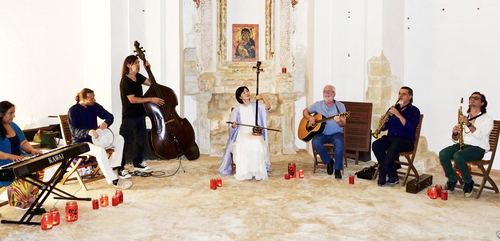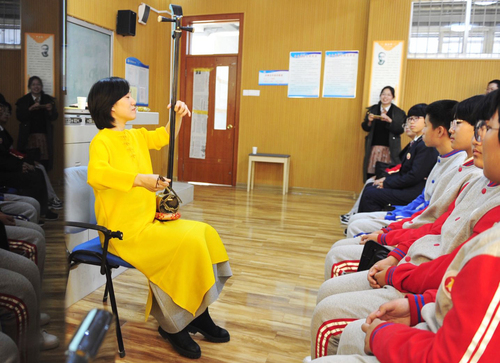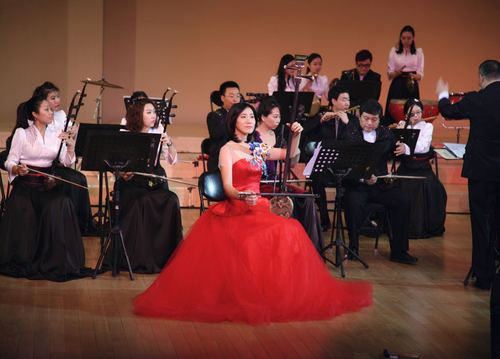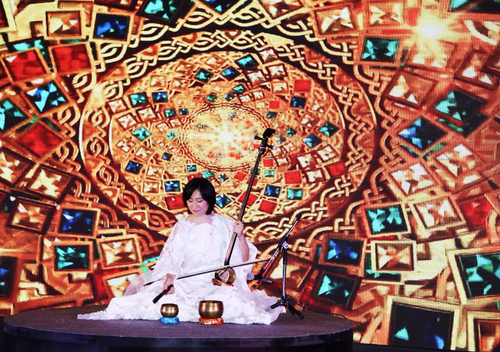Interview with Mr. Zhang Peng, the third-generation descendant of the intangible cultural heritage Leiqin - Feel the charm of Leiqin
Intangible cultural heritage, breaking time and space, glowing with Zhuoran's vitality. Music, no matter what, the ups and downs are left blank. This is the charm of the intangible cultural heritage Leiqin. Today, let us walk into the world of Leiqin with the third-generation inheritor, Mr. Zhang Peng, to experience the innovation of intangible cultural heritage and the infinite possibilities of art.

Zhang Peng often takes the reqin abroad to play with foreign friends
Retchen's Confession: Profound and Friendly
When it comes to strings, everyone is not unfamiliar with it, such as the erhu, but when it comes to the Leiqin, few people have heard it. When you have heard the origin of the Leiqin and felt the melody of the Leiqin, you will remember it deeply. Leiqin, an intangible cultural heritage, has a grand and solemn force, and standing quietly is enough to attract everyone's attention.
Zhang Peng introduced that the Leiqin was reformed by the famous Chinese folk artist Mr. Wang Dianyu in the 1920s on the basis of falling beard. Mr. Wang Lao created a stringed instrument with a longer rod, a larger barrel, a wider range, higher volume and better timbre than the pendant huqin.
Leiqin is a musical instrument with emotions and infinite possibilities. It has never been defined or blindly followed. Although it has been developed for a hundred years, the righteousness and courage of the Leiqin have always had a profound impact. Its roots lie.
On the one hand, the reqin has its own uniqueness. It is a highly vocal musical instrument and one of the most distinctive musical instruments among the national stringed instruments. Leiqin has a broad and deep range, with strong penetrating power.
On the other hand, the Leiqin is not arrogant and aloof. It can not only perform instrumental music, but also imitate "learning" and "ventriloquism" in cross talk. Through various bowing, fingering, stringing and strength changes, Leqin can not only imitate all kinds of opera singing, folk songs, human crying, laughing, dialogue, animal singing, and various natural sounds vividly, but also It can imitate the sound effects of various musical instruments such as sheng, pipe, suona, violin, trumpet, gongs and drums. Look, the multi-talented Leiqin is so full of surprises and different.
Whether it is a child or an adult, when you touch the python pattern on the leiqin and pick up the ponytail bow, your body and mind will naturally stretch. Music can nourish life, especially the leiqin. The power it conveys, Let the heart no longer fluctuate, but more calm and calm.

Zhang Peng showed the students Lei Qin's ability to imitate
Family inheritance, deep cultivation and innovation
Mr. Song Dongan, the second-generation descendant of Leiqin, is now in his old age (88 years old), and now lives in Tianjin. Mr. Song, who has been with Leiqin for more than 70 years, has the greatest wish to carry forward Leiqin and make Leiqin great. The reqin skills taught by the teacher have been passed down.
One of Leiqin's third-generation inheritors, Mr. Zhang Peng started learning erhu at the age of 4, and at the age of 15, he was taught by his uncle's grandfather (Mr. Song Dongan, the second-generation inheritor of Leiqin). What Zhang Peng learned from his uncle and grandfather is not only the skills, but also the life belief of virtue and art. At the age of 29, he took Leiqin to Beijing alone. At the age of 33, he first met Wu Na, a master of Guqin. After traveling through many countries and cities, she has been educated in a family, and has always fulfilled her promise to carry forward Leiqin, spread the seeds of Leiqin to a wider space, and made unremitting efforts to open up a wider realm of life.
In order to better promote the Leiqin culture, Zhang Peng founded the Beijing Leiqin Culture and Art Communication Co., Ltd., and is also a member of the Leiqin Research Association of the Chinese Musicians Association. She has participated in TV programs and cultural lectures for many times, and has been invited to visit and perform at home and abroad. The main representative works include "Da Leila Opera", "Zen", "Guan Ju", "Jianjia", "Shang Xie" and "Slow Voice".
Generations of people who have been engaged in reqin have never stopped exploring art. From the initial imitation of voices and repertoires, to the original reqin songs [Muslim's Wedding] [Morning on the Island] [The Song of Avanti] and so on. Among the existing works of Leiqin, mainly imitating opera singing and songs. Today, Mr. Zhang Peng hopes that Leiqin can be presented in a more vivid way in front of everyone, nourishing life with music.
The new piano song opens the opportunity to interpret the Book of Songs with "truth"
The cultivation of life by sound is a very straightforward cultivation. Our bodies are softening and our hearts are flowing.
The experience of Zhang Peng and Xiao Jiang's cooperation on "New Qin Song" has opened up another way for Zhang Peng to know Qindi: how to be more comfortable, how to be more sincere, how to make the sound more transparent without the limitations of personal labels , its profound meaning lies in "truth".
Teacher Xiao Jiang is a well-known domestic composer and is good at ethnic orchestral music. From April to December 2014, Teacher Xiao Jiang specially created new piano songs with the theme of "Book of Songs" for Zhang Peng: "Guan Ju", "Shang Xie", "Shang Xie", "The Book of Songs" Jianjia" and "Slow Sound". Under the encouragement and guidance of Teacher Xiao Jiang, the new Qin Ge was born. When recording "Guan Ju", Mr. Xiao Jiang was in his 70s. He suggested that he should have the spirit of "standing on a high mountain and seeing the small mountains and small mountains", without using skills and methods. As a result, Zhang Peng felt the transmission of the sound. Without deliberately using the method to interpret it, the effect presented is true and simple, boundless and more powerful.
What is art?

Zhang Peng plays the Leiqin
have superb skills;
To show a sublime state;
To be able to touch life;
To nourish life.
Satisfy four criteria, none is missing,
This kind of thing can be called "art".
Or "top art".
Qin, people-oriented. A good piano sound is inseparable from "truth". Teacher Zhang Peng began to integrate the exploration of music with the practice of Xinxing culture, and started a "inward travel" in the true sense. With the opening of the heart, more people can feel the incredible energy of sound.
Sound empowers life
Can sound heal? Can the sound be decompressed? Different people have different answers. Teacher Zhang Peng not only tried cross-border collision between the leiqin and the ancient instruments such as the millennium shakuhachi and the chime bowl, but also boldly innovated, combining the leiqin and sound healing, and presented it in a deeper spiritual music way, bringing you a brand new experience. experience.
The five internal organs have sounds, each sound has its own sound, and if the sound is harmonious, there is no disease. Thousands of years ago, the traditional Chinese medicine classic "Huangdi Neijing" put forward the theory of "five sounds to cure diseases", pointing out that the human body has its own frequency, and only when the frequencies are in harmony can there be no disease. This is the healing effect of sound recorded in ancient books. Music is like the great medicine king. The five sounds of Jiao, Zheng, Gong, Shang and Yu are respectively associated with wood, fire, earth, gold and water (five elements), liver, heart, spleen, lung and kidney (five viscera), anger, joy, thought, sorrow and fear (five zhi), laughter, song, cry and moan ( Five tones) Correspondingly, the five tones belong to the five elements, and the inner should belong to the five wills.
Sound is inherently energy, some music is sad, some music is uplifting, some music is peaceful, how do we experience sound and how do we choose? Open up, with a sincere heart, and you will find the answer. Let the sound penetrate every cell, purify the body and mind, replenish energy, experience the balance between the body and nature naturally, and renew and rejuvenate from the inside out.

do things without ceilings
Inheritance is full of possibilities. Zhang Peng hopes to let everyone feel the true power of art through boundless exploration, and also hopes to share with you the great beauty of art and the great freedom of life.
Teacher Zhang Peng not only tried to bring the Leiqin into Yueqin, chime bowl, guitar, keyboard, shakuhachi, and Fanbai music, but also extended his artistic attainments to various fields such as costumes and shadow puppet shows, exuding vitality.
At the beginning of this year, Mr. Zhang Peng also launched a sound activity with the theme of "accompanying" (accompanying in the workplace, companionship in life, intimate companionship, and natural companionship), which aroused strong resonance with everyone, both online and offline. . More touch points, more moving, so that the natural beauty of sound can enter more people's lives.
Now she is even busier. She conducts live broadcasts on the WeChat online video account platform, interacts with friends from all over the world, and promotes and spreads Leiqin culture and the beauty of sound.
In addition, Mr. Zhang Peng continued to trace the source of traditional culture, practiced the culture of ritual, music, morality, and sound, and explored new ways of combining traditional culture with education. He combined the wisdom of ancient poetry with the energy of sound and the art of intangible cultural heritage shadow puppets to show. This super combination of intangible cultural heritage + intangible cultural heritage will have more penetration and vitality, and will definitely leave a great impact in the field of culture and education.
When you start to get in touch with Retchen, it is no longer cold knowledge in your dictionary. When you start sharing Retchen with others, there will be one more person who follows Retchen. It is hoped that more people will understand and feel the Leiqin, which is the nutrient that nourishes our life, and makes our life more positive, full of vigor, and extremely beautiful.
"Peng·Art Space"
Initiated by Mr. Zhang Peng, the third-generation inheritor of the intangible cultural heritage Leiqin, with Leiqin inheritance as the main body, it explores more possible cultural platforms across borders, and is committed to presenting artistic content that loves life and is pure and flowing. Come to more wisdom fireworks, as well as real cultural experience.
The "Peng·Art Space" founded by Mr. Zhang Peng has been carrying out sound meditation activities, deeply practicing ritual, music, morality, energy sound, and promoting the shakuha culture; Mr. Zhang Peng continues to be the messenger of Sino-Italian culture, extending the artistic charm to more On a broad stage, we sincerely invite people from all walks of life to cooperate and present the beauty of art together.
 渝公网安备 50010702504639号
渝公网安备 50010702504639号